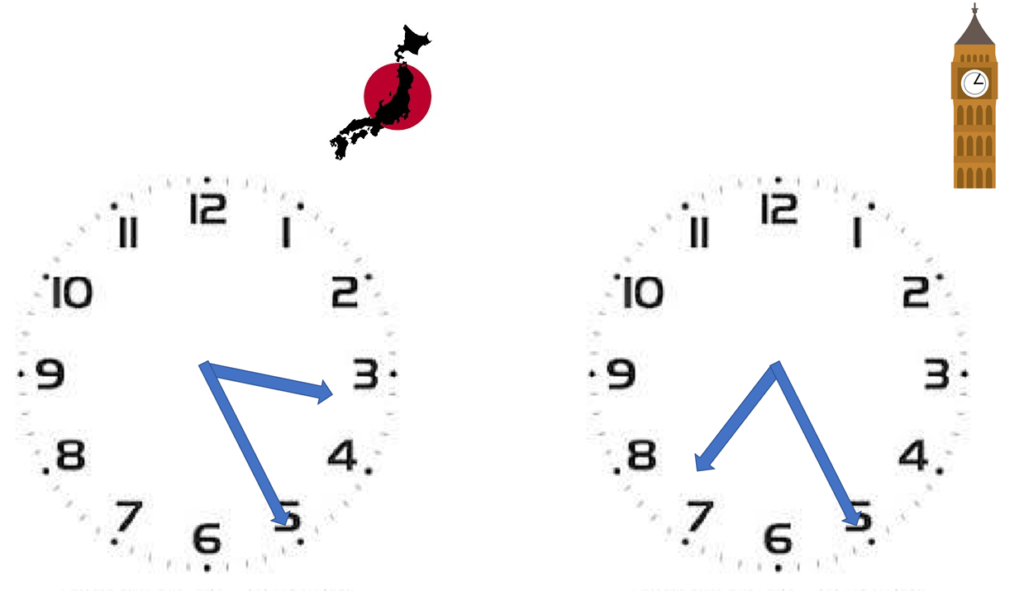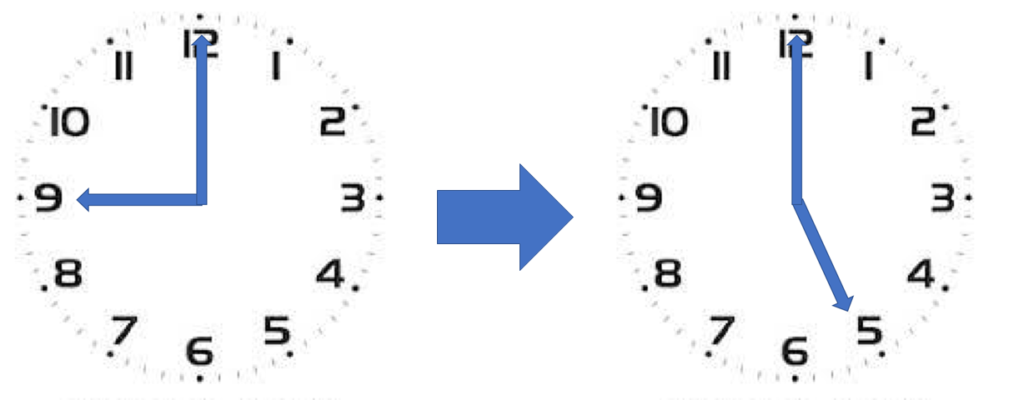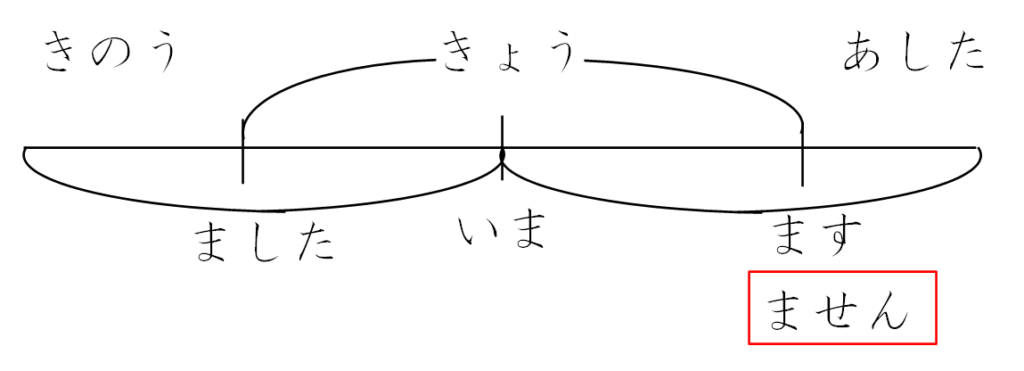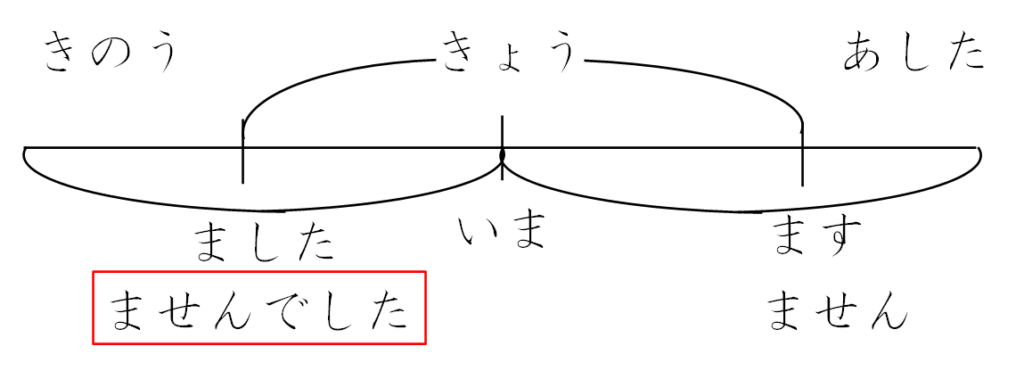
~時~分です
It’s ~:~
文型-1
Sentence style-1

「-時-分です」
It’s ~ ~
1時から12時までの時間を教える。
T teaches the time from 1 to 12.
1時、2時、3時、5時、6時、8時、10時、11時、12時を繰りかえす。
Repeat the time, 1,2,3,5,6,8,10,11,12
「4時(よじ)」「7時(しちじ)」「9時(くじ)」の言い方を練習
The way to call the time 4,7,9 are difficult. Let’s practice.

5分、15分、25分など、5の付く分の読み方(ふん)
5,15,25 are to add “FUN”.

10分、20分、30分など 10分(じゅっぷん)
10,20,30 are to add “PUN”

30分は「半」
30minutes say “HAN”
1、6、8、10が「っぷん」
“ippun, roppun, happun, jyuppun”
3、4が「ぷん」
are to “PUN”
2、5、7、9が「ふん」になる
are to add “FUN”

今 10時25分です。
It’s 10:25 now.
例文-1
Example-1

今、何時ですか。
What time is it?
3時 25分です。
It’s 3:25 PM
ロンドンは 今 何時ですか。
What time is it in London?
午前7時25分です。
It’s 7:25AM
8時間の時間の差(時差)があります。
It is 8hours time different.
日本の方が早いです。
Japan is earlier than London.
Nは~曜日です
N is the day of the week.
例文-2
Example-2
日曜日、月曜日、火曜日、水曜日、木曜日、金曜日、土曜日
Sunday, Monday, Tuesday. Wednesday, Thursday, Friday, Saturday
~曜で止めてもよい。 例、月曜
The Japanese pronunciation “Yo u bi” can stop “Yo u”

Nは~曜日です。
N is ~day.
アルバイトは何曜日ですか。
What day is your part-time job?
月曜日と水曜日と金曜日です
Monday, Wednesday and Friday.
Nは-時から-時までです
It is from ~ to ~
例文-3
Example-3

仕事は 何時から 何時まで ですか。
What time do you work from?
Nは-時から-時までです。
N work from ~ to ~
⇒ 始まる時間、終わる時間
It’s time to start, and to end
9時から 5時まで です。
I work from 9am to 5pm.
~時にVます
I verb at ~ o’clock
文型-2
Sentence style-2

何時に 仕事に行きますか
What time do you go to work?
7時に 仕事にいきます。
I go to work at 7 o’clock.
毎朝ですか。
Every day?
毎朝です。
Yes, every day.
毎朝 何時に 仕事に行きますか。
What time do you go to work every morning?
私は毎朝7時に仕事に行きます。
I go to work every morning at 7 o’clock.
「~時にV(Verb)ます」 ⇒ いつも することの 時間を いう。
I verb at the time.
例文-4
Example-4

何時に 帰宅ますか。
What time do you go home?
9時に 帰宅します。
I go home at 9.
毎晩ですか。
Every night?
毎晩です。
Yes, every night.
毎晩 何時に 帰宅ますか。
What time do you go home every night?
毎晩 9時に 帰宅します。
I go home at 9 every day.
~時から~時までVます
I verb from to
例文-5
Example-5

9時から 12時まで 働きます。
I work from 9 to 12.

12時から 1時まで 休みます。
I take a rest from 12 to 1 pm.

1時から 8時まで 働きます。
I work from 1 to 8 pm.
毎日 何時から 何時まで 働きますか。
From what time do you work every day
朝 9時から 午後 3時まで 働きます。
I work from 9 to 8 every day.
「~時から~時までVます」⇒ Vする 時間帯を 表す。
I V from to ⇒ It explains the time schedule about V
~ます/ません/ました/ませんでした
do/don’t/did/didn’t
文型-3
Sentence style-3
~ます/ました


明日、映画を見ます。
I will watch a movie tomorrow.

明後日、公園へ行きます。
I will go to the park the day after tomorrow.

昨日、コンビニへ行きました。
I went to a convenience store yesterday.

おととい、イチゴを食べました。
I ate strawberries the day before yesterday.

今朝、朝ご飯を食べました。
I ate breakfast this morning.
V(Verb) ⇒ 動詞
「いま」より前、「Vました」。「いま」より後、「Vます」
It is before now to use “masu form”.
It is after now to use “mashita form”.
~ます/~ません
do/don’t
例文-6
Example-6


今日は 金曜日です。
Today is Friday
明日は 土曜日です。
Tomorrow is Saturday.
土曜日 学校へ来ますか
Do you work on Saturday?
・・・はい、 来ます。
Yes, I do.
・・・いいえ、 来ません。
No, I don’t.
はい、 「Vます」 いいえ、「Vません」
「いま」より後で はい ⇒ 「Vます」
「いま」より後で いいえ ⇒ 「Vません」
“masu form” uses habit, from now, and in the future.
“masen form” uses negative form above.
~ました/~ませんでした
did/didn’t
例文-7
Example-7


きのう、 アルバイトしましたか。
Did you work part-time job yesterday?
・・・ はい、 アルバイトしました。
Yes, I did.
・・・ いいえ、 アルバイトしませんでした。
No, I didn’t.
はい、 「Vました」 いいえ、「Vませんでした」
「いま」より前で はい ⇒ 「Vました」
「いま」より前で いいえ ⇒ 「Vませんでした」
“mashita form” is post form
“masendeshita form” is negative post form.
ことばを覚えよう。

漢字の練習をしよう。

文の形を覚えよう

耳で覚えよう。

日本語教師 教師用教案


コメント